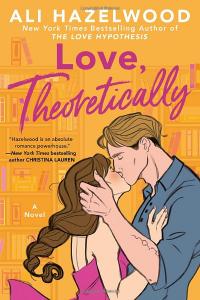 Love, Theoretically
Love, Theoretically
Berkley, 2023
Agent: Thao Le
Rival physicists collide in a vortex of academic feuds and fake dating shenanigans in this delightfully STEMinist romcom from the New York Times bestselling author of The Love Hypothesis and Love on the Brain.
The many lives of theoretical physicist Elsie Hannaway have finally caught up with her. By day, she’s an adjunct professor, toiling away at grading labs and teaching thermodynamics in the hopes of landing tenure. By other day, Elsie makes up for her non-existent paycheck by offering her services as a fake girlfriend, tapping into her expertly honed people-pleasing skills to embody whichever version of herself the client needs.
Honestly, it’s a pretty sweet gig—until her carefully constructed Elsie-verse comes crashing down. Because Jack Smith, the annoyingly attractive and arrogant older brother of her favorite client, turns out to be the cold-hearted experimental physicist who ruined her mentor’s career and undermined the reputation of theorists everywhere. And he’s the same Jack Smith who rules over the physics department at MIT, standing right between Elsie and her dream job.
Elsie is prepared for an all-out war of scholarly sabotage but…those long, penetrating looks? Not having to be anything other than her true self when she’s with him? Will falling into an experimentalist’s orbit finally tempt her to put her most guarded theories on love into practice?
Accolades:
Amazon, Best Romance Books of 2023 So Far
#1 on the New York Times Paperback Fiction Bestseller List
Reviews:
"Hazelwood’s latest STEM-set novel may be her best yet, addressing not only discrimination among different realms of physics, but the unconscious bias Elsie has to continually fight as a woman in her field. Elsie and Jack’s banter is electric and hilarious from the start, and Jack earns the mantle of a swoonworthy hero who keenly discerns the heart of his love interest even when Elsie doesn’t always represent herself genuinely. Their happily-ever-after is a standout, too—these two are content to take things at their own pace, a refreshing narrative choice that doesn’t conform to every assumption of the genre. A dynamic rivals-to-lovers romance." -Kirkus Reviews starred review
"Bestseller Hazelwood (Loathe to Love You) delivers a decidedly quirky and thoroughly charming tale. The fake dating trope gets a techy update via Faux, an app connecting clients with pretend partners for hire, through which Boston adjunct professor Elsie Hannaway finds side gigs while she searches for a better-paying job in theoretical physics. While interviewing for her dream job at MIT, Elsie’s worlds collide: her favorite fake-dating client’s brother, whom she knew as Jack Smith, is actually Dr. Jonathan Smith-Turner, a legendary young physicist whose views are at odds with Elsie’s. The ensuing STEM-themed enemies-to-lovers romance is simply a delight, though it’s complicated by the fact that Jack believes Elsie is his brother’s girlfriend. Meanwhile, sunshiny Elsie’s imposter syndrome rings true as she navigates the cutthroat world of academia (“STEM academia is 98 percent politics and 1 percent science”) and learns that her mentor and idol has feet of clay. Geeky science jokes, humorous student emails, and expertly delivered snarky banter enhance the narrative. Readers will cheer for Jack and Elsie and their bumpy road to happily ever after." - Publisher's Weekly starred review
“Theoretical physicist Elsie Hannaway works as both an adjunct professor and fake girlfriend. This works out fine until she has to contend with Jack Smith, the arrogant experimental physicist who is her professional enemy. Hazelwood makes it easy to get wrapped up in this science-based story with her relatable and witty characters. This is a quick and easy read; a good heartfelt book.” - Libary Journal
“Love, Theoretically combines meme-based humor, sizzling romantic tension, soul-searching personal growth, and blazing critiques of the glaring disparities in academia. This book isn’t just awesome in theory — it’s a proven fact!” - Library Journal